ASX sheds 3pc on warning of prolonged virus hit
The market had its worst day since May 1 as investors reassess the recovery trajectory, shifting to defensive trade and prompting a bank slide.
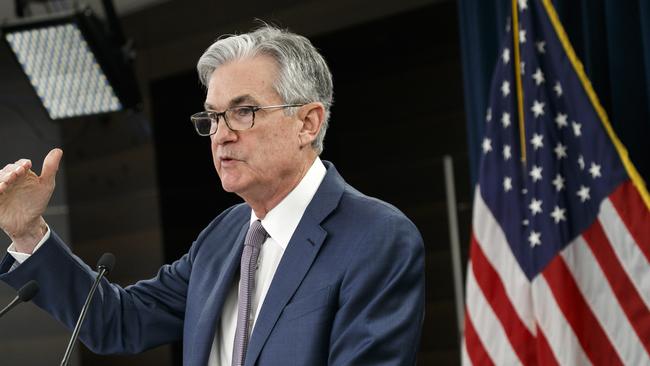
- Recovery doubts send ASX down 3pc
- Powell not spooked by surging markets
- JB Hi-Fi tips 20pc profit jump
- Kogan jumps 15pc on $100m placement
That’s all from Trading Day for Thursday, June 11. The ASX finished the session down 3pc as investors shift to defensive names and coronavirus concerns surface again. In company news, JB Hi-Fi set out guidance for annual profit growth to top 20pc while Kogan outperformed after raising $100m.
Early this morning the US Federal Reserve indicated that it would not be raising interest rates from zero until 2022, alongside a warning on the economy’s recovery. US futures point to further falls to come tonight.
John Stensholt 8.45pm: Contract discounts cost AFL $150m
Foxtel and Seven West Media will save about $200m on their AFL coverage for the next three years after clinching revised broadcast deals just before the opening bounce of the restart of this year’s season on Thursday.
Under the deals, caused by the COVID-19 pandemic that shut down sport for three months and reset the value of sports broadcast rights in the process, Seven will extend its existing free-to-air contract through to 2024 in a contract worth $730m over five years.
But the AFL has failed to agree to an extension past 2022 with Foxtel, which has been paying the biggest share of the combined $2.508bn broadcast contract.
By contrast, the NRL agreed late last month to extend its deal with Foxtel to the end of 2027.
The AFL’s deals represent about 13 per cent less than the previous deal, for which it was receiving about $415m annually from Seven, Foxtel and Telstra, meaning it forgoes about $150m until 2022 in rights fees.
Seven told the ASX on Thursday evening that it had an extension to 2024, and expected to save about $87m over the next three seasons as a result of the discounted AFL contract. The Seven savings include a reduction in media rights, production savings and other benefits.
Read more
Glenda Korporaal 7.58pm: Virgin creditors push for more power
Representatives of Virgin’s unsecured bond and note holders, who are owed around $2bn, have been allowed to access the airline’s data room by administrator Deloitte’s Vaughan Strawbridge in a move which could potentially give them greater negotiating power over the airline’s future.
The Australian understands the group, represented by advisory firm Faraday, has been invited by Mr Strawbridge to have access to sensitive commercial information about Virgin which would give it more context to assess the nature of the bids offered by short-listed parties, Bain Capital and New York hedge fund Cyrus.
It would also give it more negotiating power to propose other options, including a potential recapitalisation of the airline which could see the note and bond holders continue to remain as creditors for the life of their current bonds, some extending out to 2024, rather than losing most of their money now, and having to do a deal when Virgin is at a low point.
Faraday represents the biggest group of unsecured creditors, ranging from more than 5000 “mum-and-dad” retail investors to about 30 major institutional bond holders.
The unsecured bond holders, some of whom invested in a $325m note raising launched by Virgin last November, are worried they could lose almost all their money in the current negotiations unless they can take a more proactive stance in negotiations.
James Kirby 7.36pm: Listen to the Money Cafe podcast
Here’s this week’s Money Cafe, with Wealth editor James Kirby and InvestSMART’s Alan Kohler reunited for a coffee in person.
They discuss why Kogan is on a tear, crazy credit card fees and assessing the FIRE (Financial Independence Retire Early) movement.
Listen to the podcast for the details:
- Inside the stock market recovery: which tech and retail stocks have been flying.
- Will the DIY and home office bonanza continue?
- The alternative to credit cards – buy-now pay-later companies.
- Retiring at 50 – is it worth the saving pain?
- The importance of dollar cost averaging.
- Private/retail superfunds versus industry funds – what’s the difference?
- The impact of civil unrest on financial markets.
- How to save for a house in your 20s?
- The return from shares now, might be lower than what they would be normally.
Don’t forget to send your own questions to James Kirby and Alan Kohler via moneycafe@theaustralian.com.au
Find all episodes of The Money Cafe and subscription links here.
Eli Greenblat 7.03pm: GM collision course with Holden car dealers
US car giant General Motors looks to be headed for a collision course with its car dealer partners in Australia after two days of settlement discussions over GM’s decision to dump the Holden brand failed to reach an agreed compensation deal.
Negotiations facilitated by retired Federal Court Judge, the Honourable Mr Peter Jacobson QC, were not able to improve the current compensation offer from General Motors Holden.
The dealerships and car yards, many of which have been selling and servicing the iconic Holden car for decades, claim the current compensation offer from GMH fails to adequately compensate dealers for their expected losses and millions of dollars in investment to support the Holden brand.
Perry Williams, Nick Evans 5.55pm: Gupta slashes costs, jobs in downturn
Billionaire Sanjeev Gupta will slash costs and cut jobs with steel and aluminium consumption plummeting amid the COVID-19 economic slowdown.
The global tycoon’s GFG Alliance, which owns a string of Australian heavy industry and mines, will remove 30 per cent of its global costs and shed an unspecified number of roles as it responds to the market downturn to put the business on a “firm economic footing”. GFG employs 35,000 people across 30 countries.
The cost shedding will be split three-ways by reducing jobs to reflect lower demand, lowering corporate overheads and finding new efficiency and productivity gains at its sites.
Gerard Cockburn 5.34pm: Little chance of fixed income growth
Investment analysts told a Bloomberg forum on Thursday that they believe there will be little to no opportunity in fixed income growth, as forecasts point to a lower-for-longer official cash rate environment in Australia.
A slew of investment analysts joined the Bloomberg forum held on Thursday morning, and flagged the Reserve Bank’s current cash rate target of 0.25 per cent was likely to persist for at least three years, with the financial climb to recovery following the coronavirus pandemic likely to be slow.
Pendal Group head of bond and defensive strategies Vimal Gor said markets were showing no opportunity for fixed price discovery and would be solely driven by government and central bank spending.
Lachlan Moffet Gray 5.01pm: Fidelity investment ‘winners and losers’
Investors searching for returns in a post-COVID world should remain focused on technology and financial industry equities, but be aware that the pandemic has created an environment of “winners and losers” where sector-wide gains are increasingly unlikely, Fidelity analysts have said.
In a conversation with investors and journalists on Thursday, Fidelity’s Asia Pacific CIO Paras Anand said that the unique economic landscape created by the pandemic and the unequal application of fiscal policy by governments across the world seeking to stimulate their respective economies would result in some companies performing better than comparable competitors.
“The impact on individual companies, individual economies is going to be highly varied,” Mr Anand said, noting that the pandemic had lifted video conferencing software Zoom’s market capitalisation beyond that of the world’s seven largest airlines.
4.37pm: Retail, travel wind back
Electronics retailer JB Hi-Fi revealed it was thriving during the pandemic, unveiling 20 per cent comparable sales growth in its Australian stores as it set out forecasts of annual profit growth as much as 22pc. The good news was seemingly already priced in and shares fell 4.2 per cent to $40.22 by the close.
Similarly, Harvey Norman pulled back by 3.2 per cent to $3.69 after similar promising sales growth.
Fellow retailer Kogan.com climbed to new record highs of $14.27 before closing up 6.9 per cent to $13.23 as it returned to trade after a $100m raise to fund growth opportunities.
Concerns of a prolonged coronavirus hit weighed on the rest of the sector, sending Premier Investments lower by 5.4 per cent to $16.35 while Super Retail lost 5.8 per cent to $8.20.
Meanwhile Flight Centre was worst hit, falling 10.4 per cent to $15.10.
Here’s the biggest movers at the close:
4.13pm: Recovery doubts send ASX down 3pc
Renewed jitters on the pace of economic recovery and a resurgence of new coronavirus cases in the US put a sharp stop to the market’s 7-day rally, as $57bn was wiped off the boards.
A warning from the US Federal Reserve was the key catalyst for a broad global market drop – chairman Jerome Powell said the health crisis would weigh on economic activity and posed “considerable risk” to the medium-term outlook.
His comments dialled back investor optimism of a V-shaped recovery, taking local shares down accordingly.
By the local close, the benchmark ASX200 was lower by 188 points or 3.05 per cent to 5960.6 for its worst day since a 5 per cent drop on May 1.
On the All Ordinaries, shares fell by 190 points or 3.03 per cent to 6079.5.
3.31pm: China travel alert threatens growth: NAB
China’s recent alert against travel to Australia could affect economic growth if it persists once borders reopen, according to NAB.
“While the move won’t impact actual travel at present given Australia’s borders are closed due to COVID-19 restrictions, should the travel alert persist when borders are reopened at an unknown date, a large impact could be felt given Chinese education and tourism account for around 0.8 per cent of GDP,” says NAB’s director of economics, Tapas Strickland.
“The travel alerts could also impact the chances of an earlier restart of education with some talk of Australia allowing early entry via a 14-day quarantine period and could also affect the plans of students and tourists for next year.”
He notes that during 2019 around 1.5 million Chinese tourists visited Australia and comprised around 15pc of all tourists by number and 33pc by total spending.
But while Chinese tourism can be heavily influenced by Chinese government policy, he notes that since the current alert is just a warning, it’s unclear how strictly such advice will be followed.
In education, Mr Strickland says there were 758,154 international students in Australia in 2019, comprising some 3pc of Australia’s resident population, with 28pc from China.
Robyn Ironside 2.50pm: Virgin to double domestic capacity
Virgin Australia is ramping up its domestic flights to match Qantas despite ongoing uncertainty over its financial position.
By early next month, Virgin Australia will add about 30,000 seats across 320 flights, doubling its current schedule, despite concerns about the airline’s cash reserves, after going into administration on April 21 with debts of $6.8bn.
Virgin Australia group chief commercial officer John MacLeod said the services would be a welcome boost to tourism and the economy.
VAH shares haven’t traded since April 9.
Read more: Virgin backs itself as Moody’s backs Qantas
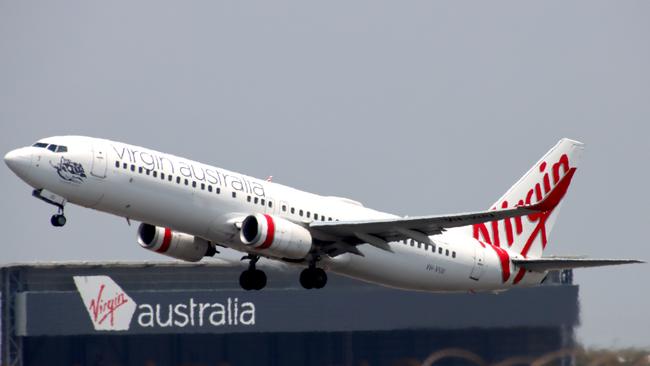
2.13pm: Banks take hit after recovery rally
After a double-digit rally, the major banks are taking a beating today, by far the biggest weight on the broader market.
As the ASX pulls to fresh daily lows of 5959.6, Commonwealth Bank is off by 4.3pc, Westpac down by 5.9pc, ANZ lower by 6.1pc and NAB by 5.5pc.
Macquarie isn’t immune, its shares are off by 4.2pc while regional banks BOQ and Bendigo are down by 4.6pc and 4pc respectively.
Keep in mind though, the financials index had rallied by 25 per cent over the past fortnight, before being cut back to size at the start of the week.
Read more: Surging bank shares get new lift
2.07pm: $A joins pullback as ASX loses 2.6pc
The Aussie dollar has succumbed to the negative momentum in the market today, slipping by 0.9pc to a two-day low of US69.35c as the local benchmark extends losses.
Australia’s S&P/ASX 200 is falling 2.6pc to a 2-day low of 5986.5 as the fall in US futures picks up speed.
S&P 500 futures are down by 1pc while Dow futures are falling 1.3pc and Nasdaq futures are slipping 0.6pc.
Risk-appetite continues to sour as US #COVID19 cases surpass 2 million
— Daniel Moss (@DanielGMoss) June 11, 2020
The haven-linked #USD and the Japanese #Yen soaring as yields on the US 10-year drop back below 0.72bps
The risk-sensitive #AUD follows #SP500 futures lower pic.twitter.com/KN9Q83JdWw
Bridget Carter 2.05pm: PEXA reviews capital structure
DataRoom | Property transfer company Property Exchange Australia has hired Grant Samuel as it embarks on a review of its capital structure.
The appointment comes with talk in the market that the group could be looking at a refinancing.
Sources close to the company say that Grant Samuel had been brought in to assist with creating an appropriate capital structure for a company of PEXA’s size.
PEXA was purchased for all equity during November 2018 in a $1.6bn joint bid with CBA and Morgan Stanley Infrastructure Partners.
Earlier this month, the group said property transfer numbers for June were looking stronger than a year ago, despite the coronavirus pandemic.
Read more: Little accepts Link Group’s PEXA offer
David Swan 1.41pm: Tesla the most valuable carmaker
Elon Musks’ tech powerhouse Tesla has passed Toyota to become the world’s most valuable carmaker, after the US company moved to restart product of its electric vehicles.
Tesla’s share price closed at $US1025 per share on the Nasdaq overnight, giving the company a market capitalisation of $US190bn, about $US8bn more than Toyota, which is worth $US182bn.
It also means Tesla is worth more than General Motors, Ford and Fiat Chrysler combined.
Tesla stock has defied sceptics; in January, Bank of America analysts predicted the share price would achieve a 12-month average of just $US350.
The rally could be in part due to a recently-leaked memo from Elon Musk, in which the chief executive pushed for his employees to accelerate development of the Tesla Semi, in hopes of the company reaching “volume production” for the vehicle soon.
On Wednesday Musk was asked whether the report about the leaked email was correct, and he replied “Yes”.
The company recently dropped prices of its Model S and Model X electric cars in Australia, though both models still cost more than $120,000.

1.19pm: Iron ore could spike to $US120: Citi
Citi has upgraded its September-quarter iron ore price forecast to $US100 a tonne.
The US investment bank says iron ore could “easily spike” to $US120 due to coronavirus-related supply disruption in Brazil.
Meanwhile, Commonwealth Bank upgraded its December-quarter iron ore price to $US85 a tonne.
Singapore iron ore futures are little changed at $US103.35 and CNY765.50 a tonne respectively.
Iron ore miners in Australia are mostly weaker, with BHP down 1.4pc, Rio Tinto down 1.1pc and Fortescue down 0.2pc.
1.01pm: Share drop worst in 6 weeks
As shares pull further into the red at lunch, Australia’s market is headed toward its worst day in 6 weeks.
The S&P/ASX 200 fell 2.2pc to a 2-day low of 6015.4 points and last traded down 2.14pc.
A fall of more than 1.72pc today would be the worst since May 1.
The index bounced 41pc from an 18-year low of 4402.5 on March 23 to a 3-month high of 6198.6 on June 9.
In doing so it achieved its fastest bull market on record, its highest ever 12-month forward PE rating near 20 times and its lowest ever dividend yield near 3.3pc.
Here’s the biggest movers at 1pm:
Ben Wilmot 12.40pm: Investec Property plots buy out
The $1bn Investec Australia Property Fund is set to become the latest vehicle to take control of its own destiny and has begun talks with the South African bank Investec, that runs it, in order to buy out its management platform.
The move to become an internally run company would bring greater efficiencies and is preferred by listed investors, particularly as the vehicle starts to grow.
The dual-listed fund owns buildings in major CBDs and warehouses, and has been relatively insulated from the coronavirus crisis.
The trend towards internalising management has gained pace in the Australian listed real estate investment trust sector.
This year Viva Energy REIT broke away from the management of its major tenant, the energy company Viva Group and before that Brett Blundy’s Aventus Group internalised its management and flagged it would further grow its $2bn shopping centre empire.
The Investec fund’s board said it had commenced early stage discussions with the Investec Group to internalise the management, and the trust would keep its existing management team.
The fund’s independent directors, advised by JPMorgan and Macquarie Capital, are considering the proposal.
Read more: Viva Energy REIT cuts ties with Viva Energy
12.27pm: New virus concerns send ASX backward
Australia’s share market has extended its intraday fall as renewed virus jitters weigh on sentiment.
After paring an early fall of 1.8pc to 1pc amid a bounce in S&P 500 futures, the S&P/ASX 200 fell as much as 2pc to a 2-day low of 6024.8.
As well as a record number of coronavirus cases in Texas and a pick-up in cases in Florida, it is now reported that a protester in Melbourne has tested positive to coronavirus.
Travel, casinos and mall REITs are among the weakest stocks today, along with Financials and Energy. Flight Centre is down 6.7pc, Corporate Travel is down 5.8pc, Webjet is down 4.5pc and Qantas is down 4.1pc.
Scentre is down 5.9pc and Stockland is down 3.6pc, Crown is down 4.5pc and Tabcorp is down 3.8pc.
Banks are doing most of the damage with the 4 majors down 2.7pc to 4.5pc.
AUD/USD has been less affected however as it trades around 0.6975 from 0.6998 in NY.
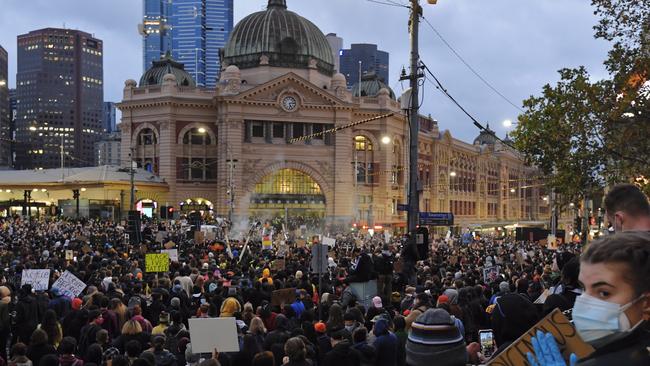
Bridget Carter 12.19pm: Allen to leave UBS for Jarden
DataRoom | UBS managing director Aidan Allen is leaving the Swiss investment bank.
It is understood that Mr Allen told UBS this week of his departure.
The expectation is he will be joining the New Zealand boutique banking group Jarden.
Mr Allen rejoined UBS in Australia almost two years ago after he left the bank to become head of investment banking in Australia at Citi.
He is regarded as a high profile banker known for his close relationships with the private equity community and is considered somewhat of a rainmaker when it comes to deal making.
Last month, talk emerged that Mr Allen was within Jarden’s sights, although he denied at the time he had fielded approaches.
More to come
Ben Wilmot 12.16pm: AusSuper backs build-to-rent
The country’s largest superannuation fund, AustralianSuper, has made a major play in the build-to-rent sector, taking a stake in Melbourne-based developer, Assemble Communities.
The superannuation fund has purchased a 25 per cent share in the company and will have the opportunity to invest in Assemble Communities’ pipeline of projects, which could see it commit hundreds of millions of dollars.
The investment will enable the developer to grow its “rent with the option to buy” property portfolio, known as the Assemble Model, which addresses housing affordability and access to homeownership.
Over time, the investment will support Assemble to deliver build to rent assets and potentially affordable build to sell in the future.
MAKE Ventures, which acquired Assemble Communities in 2014, is co-investing up to $50m and making available the majority of its project pipeline — of more than 4,000 dwellings and 120,000sq m of non-residential programming — to be delivered by Assemble Communities.
AustralianSuper reviewed a number of models in affordable housing before choosing the Assemble Communities business. Other players in build-to-rent include Mirvac, Grocon, Greystar and Salta Properties.
Bridget Carter 12.15pm: Jarden on the hunt for more recruits
DataRoom | While all the talk has died down surrounding plans by former UBS Australia boss Matthew Grounds to start a new venture, there continues to be movement afoot on the local investment banking scene.
It is understood that New Zealand boutique Jarden, which poached some of Australia’s best investment banking talent in recent months, remains on the hunt for additional recruits.
Analysts from various Australian banking teams are said to be in its sights as it looks to build up its operations here to become a dominant player in the local market after opening an office here last year.
It comes after talk emerged last month that UBS investment banker Aiden Allen was within its sights, although he denies he has fielded approaches.
Still, there is a suggestion that Mr Allen, considered a rainmaker when it comes to deal making activity, could be departing the Swiss bank as early as this week, which has sparked somewhat of a guessing game as to where he could be off to next.
Read more: UBS’s Aiden Allen linked to Jarden M&A role
11.50am: US mortgages to weigh on Computershare
Computershare is one of the worst performers in trade so far after a downgrade to Sell from Citi and a warning on its US mortgage servicing arm.
Analysts led by Nigel Pittaway forecast Computershare’s revenue growth in the US arm to slow materially from around 20pc compound annual growth over the past four years to just 6pc in the near term amid government imposed mandates in relation to foreclosures and lower margin income and accelerated loan run-off.
“This slowing of momentum coupled with significant other revenue headwinds see us forecast 8pc lower EPS in FY21 despite allowing for substantial cost savings,” he says.
Citi has a Sell rating on the stock with a $12 target price.
CPU last traded down 5.7pc to $13.22.
11.38am: Gold miners rally in rush to havens
Gold miners are dominating in the top market movers in morning trade, as the commodities price lifts in a rush to safe havens.
The warning from the US Fed today that growth could be slugging for a sustained period sparked a near 1pc jump in gold prices.
That’s spurred a 5.5 per cent lift in Northern Star as Newcrest adds 5.1pc, Saracen gains by 4.8pc and St Barbara lifts by 4.2pc.
10.55am: $A headed for sustained recovery: NAB
The recent recovery in the Australian dollar is looking “much more secure than a month ago”, according to NAB, which tips the currency to hit US72c by the end of the year.
In analysis of the currency’s recent outperformance, head of FX strategy Ray Attrill writes that previous attempts by the currency to rally were hard to justify, but a shift in the macro environment could help it hold past US70c in the longer run.
Still, Mr Attrill says levels above US70c do look “quite rich” currently, and should consolidate in the near term and could dip back into the mid-to-high US60c.
“Risk sentiment was the major driver of the Australian dollar on the way down, and has been the principal driver of the subsequent improvement, with auxiliary support from commodity prices, notably oil and gold in our models, though the sharp rise in iron ore prices is doubtless also lending a hand,” he says.
“Accumulating evidence of a China-led global growth recovery is seen providing further direct support for AUD in H2 2020 and beyond, as too is the quite compelling evidence that a USD depreciation cycle is underway.”
NAB has revised up its Australian dollar forecasts to US72c for end 2020, and US75c for end 2021.
AUDUSD last down 0.1pc to US69.87c.
10.29am: Kogan jumps 15pc
Shares in online retailer Kogan have jumped by 15 per cent at the open, after the group completed a $100m placement to fund growth opportunities.
In opening trade, shares rose to new records of $14.27, and settled up 10pc to $13.62.
Shares in the placement were offered at $11.45 apiece.
The company told the ASX it planned to use the funds to “provide financial flexibility to act quickly on future value-accretive opportunities that broaden the company’s offering, expand its customer base or enhance its operating model’’.
Read more: Online retail giant Kogan in hunt for acquisitions
10.10am: Shares tumble 1.8pc
Local shares have taken a 1.8 per cent hit at the open, following the US Fed’s warning that global economic recovery will be more sluggish than expected.
At the open, the ASX200 fell by 1.79 per cent to two-day lows of 6038.3, but settled to losses of 1.5pc or 92 points at 6056.7.
All sectors bar health care are trading in the red, with banks and real estate stocks the worst performing as part of a shift back to growth and defensive names, and away from cyclical and value stocks.
JB Hi-Fi is higher by 0.4pc to $42.17 after a strong trading update while Northern Star is leading the gold miners higher with a 7.5pc boost.
S&P 500 futures are recovering to -0.3pc from -0.7pc earlier.
Gerard Cockburn 9.57am: ANZ cuts savings rates further
ANZ has further shaved savings rates on its deposit accounts, as a low interest rate environment within Australia persists.
The major bank has slashed bonus savings rates on both its Online Saver and Progress Saver products by 15 basis points.
Its Online Saver product now attracts a three month introductory rate of 0.8 per cent and an ongoing rate of 0.05 per cent.
ANZ’s Progress Saver has a new savings rate of 1 per cent if the conditions of no withdrawals and a minimum monthly deposit of $10 is met.
Canstar finance commentator Steve Mickenbecker said the cuts will further hurt savers and retirees.
“The ANZ rate cuts are more bad news for savers and self-funded retirees, who have seen nothing but declining returns for a couple of years,” Mr Mickenbecker said.
“The cuts have come in three stages, a flattening of the curve for savers but nonetheless devastating for people reliant on fixed income form savings.”
David Swan 9.49am: Apple first US company to hit $US1.5tn
US tech giant Apple has become the first US company to hit $US1.5 trillion ($2.15tn) in market value, with a strong performance yesterday pushing it to a record high.
The company’s last high was in late January, before the COVID-19 pandemic sent its share price down 35 per cent by late March.
Investors say the company has been buoyed by a highly anticipated 5G iPhone model, strong App Store sales and a transition away from Intel processors in its Macs, to ARM-driven processors.
Microsoft and Amazon are close behind Apple, which closed at $US352.84 per share.
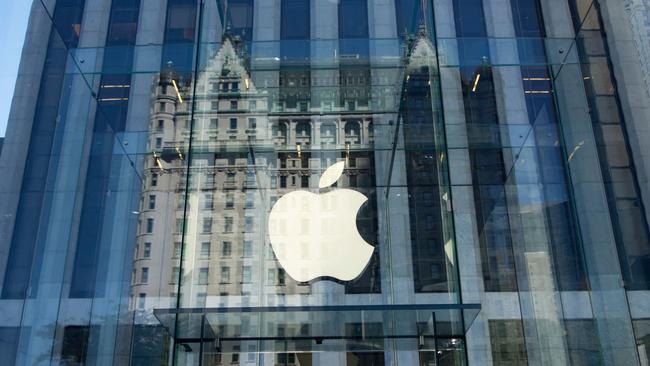
9.40am: ASX dip could be short-lived
An opening fall in Australia’s share market may be short lived as investors watch the fallout from the US Fed.
At this morning’s press conference, chair Jerome Powell warned of a slow economic recovery, though FOMC members saw no rate hikes through 2022 and said the board will keep buying assets: “at least at the current pace to sustain smooth market functioning, thereby fostering effective transmission of monetary policy to broader financial conditions”.
Overnight futures relative to fair value suggest the S&P/ASX 200 will fall 1.4pc and S&P 500 futures are down 0.7pc so could fall as much as 2pc, but support may emerge near 6000 points.
Investors will initially continue to switch back from value and cyclicals to growth and defensives after a similar move in the US after Fed Chair Powell warned “it’s a long road” to recovery, and “there’s a risk of longer-lasting damage to the economy”.
The Dow fell 1pc and the S&P 500 fell 0.5pc, with cyclical and value sectors including Energy, Financials, Industrials, Real Estate and Materials underperforming.
After surging 30pc in the past 3 weeks, Australian banks could bear the brunt of a pullback this morning. The US KBW Bank index fell 5.3pc overnight.
But the Nasdaq rose 0.7pc, with the S&P 500 Technology sector up 1.7pc, while Health Care, Consumer Staples and Communications outperformed.
Traders are also watching a potential second wave of coronavirus cases – Bloomberg’s top US story is that Texas reported 2504 coronavirus cases, its highest number since the pandemic and a month into its reopening, Florida this week reported 8,553 new cases.
9.22am: Alliance Aviation seeks up to $122m
Alliance Aviation, the charter operator that has remained profitable during the coronavirus shut down, is seeking funds to buy additional aircraft and invest in growth.
The group was halted ahead of the open pending a $91.9m institutional placement and up to $30m share purchase plan.
Sharing details of its plans, Alliance bragged it had “continued to operate profitably due to its focus on contract flying, a diverse business model and its ability to react quickly to the changing aviation environment”.
“Alliance believes it is now in an enviable position and is looking to invest for future growth.”
It said the funds would predominantly be used to buy additional aircraft as it looks to provide additional services to its existing customers.
Shares in the placement are being offered at $2.95 apiece, a 5pc discount to their last trading price of $3.10.
Last month, Alliance said it was expecting annual profit before tax in excess of $40m.
Read more: Charter flights take off for Alliance
9.05am: JB Hi-Fi forecasts 22pc profit jump
Electronics retailer JB Hi-Fi says a jump in sales in the second half to date will help it secure as much as a 22 per cent profit uplift for the full year, thanks in large part to panic buying of home office setups and whitegoods at the onset of the coronavirus restrictions.
The group reported a 20 per cent jump in JB Hi-Fi Australian comparable sales for the second half to date, to take year-to-date local sales up 10.3pc, while its Good Guy sales are higher by 10.3pc year-to-date.
While closures in New Zealand weigh slightly, with sales down 7.3pc year-to-date, the company said it still expected a significant profit boost.
After previously withdrawing guidance, the company said it was on track for total net profit in the range of $300m to $305m, an increase of between 20pc and 22pc on the previous year.
A review of its New Zealand assets is expected to result in a non-cash impairment of $25m.
JBH last traded at $42.
Read more: Stores cash in on home spending splurge
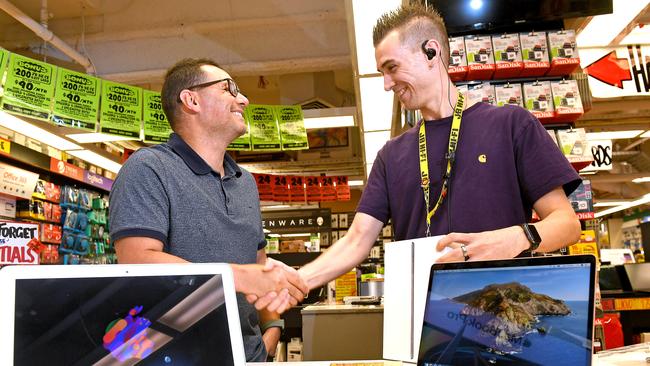
9.01am: Kogan completes $100m placement
Online retailer Kogan has completed an institutional placement to raise $100m, reportedly oversubscribed with strong domestic and international demand.
Proceeds of the offer, along with a further $15m share purchase plan, will be used to fund future “value accretive opportunities”.
Shares were offered at $11.45, a 7.5pc discount to the stock’s last closing price.
“To all our shareholders, your company has gone from strength to strength since listing and, with the capital we have raised this week, your company is now stronger than ever,” chairman Greg Ridder said.
8.52am: What’s on the broker radar?
- Aventus Group raised to Outperform – Macquarie
- Bellevue Gold target price raised 33pc to $1.20 – Macquarie
- Computershare raised to Neutral – Citi
- Evolution raised to Outperform – Credit Suisse
- GrainCorp cut to Hold – Bell Potter
- Harvey Norman price target raised 22pc to $4.50 – Citi
- Harvey Norman raised to Buy – Jefferies
- IPH raised to Add – Morgans
- JB Hi-Fi cut to Neutral – UBS
- Integral Diagnostics cut to Neutral – Credit Suisse
- Magellan rated new Positive – Evans and Partners
- Northern Star raised to Outperform – Credit Suisse
- Oz Minerals target price raised 26pc to $12.60 – Morgan Stanley
- South32 cut to Underperform – Macquarie
- Worley cut to Underweight – Morgan Stanley
- Worley cut to Hold – Jefferies
8.43am: Powell not spooked by surging markets
Federal Reserve Chairman Jerome Powell brushed off concerns that asset markets may be frothy amid a still troubled economic outlook during his press conference Wednesday after the Fed’s latest policy meeting.
In the wake of the central bank’s and the government’s aggressive responses to help lift the economy and shore up the financial sector as the coronavirus pandemic took hold, some observers are alarmed at how much stocks, in particular, have rallied.
The alarm comes from a weighing of the market’s performance versus the outlook for the economy. The Fed said in its statement Wednesday that “the ongoing public health crisis will weigh heavily on economic activity, employment, and inflation in the near term, and poses considerable risks to the economic outlook over the medium term.”
As they kept rates at near zero, central bankers offered forecasts that showed a big hit to the economy this year, with a modest rebound over coming years.
But the outlook remains uncertain, and it is unclear whether the Fed will have to do more, and whether more fiscal support also will be needed.
Mr Powell in his press conference said that when it comes to markets, the central bank is primarily concerned that things are functional. He said the financial system is in strong shape, and the Fed’s focus is on the economy when it considers what policy actions it will need to take.
Dow Jones Newswires
7.37am: Google unveils Android 11 beta
Google has released a test version of its annual upgrade to its Android software without the usual fanfare heralding the latest operating system powering most smartphones.
The debut of Android 11’s “beta” version was announced on Wednesday in a blog post, along with video tutorials for the makers of smartphone applications on Google’s YouTube service.
Android 11 will offer several new features making it easier for people to find notifications about incoming texts. It also gives users the ability to quickly open a digital conversation by pressing on a floating “bubble” identifying the person on the other end of a text. The new Android bubbles mirror a feature that Facebook has been using in its Messenger app for years.
The next version of the software also is designed to do a better job of guarding people’s privacy, something Google is frequently accused of invading as it collects information to sell ads.
Users will be asked if they wish to grant an app access to their location for one time only and then Android won’t allow access until the user authorises it again. Android 11 also will automatically identify when an app hasn’t been used for an extended time and turn off previous permissions that users may have forgotten they granted in the past.
AP
7.30am: ASX set to slip
Shares are tipped to slip early on the Australian stock market after the US Federal Reserve projected a more sluggish recovery than investors expected. The local SPI 200 futures contract was down by 63 points, or 1.03 per cent, to 6,066.0 at 7am on Thursday, indicating losses in share values early. In the US, policymakers at a two-day meeting of the Reserve projected a 6.5 per cent decline in gross domestic product this year and a 9.3 per cent unemployment rate at year’s end.
Locally, the benchmark S&P/ASX200 index on Wednesday closed up 3.5 points, or 0.06 per cent, at 6,148.4 points.
The All Ordinaries closed up 6.4 points, or 0.1 per cent, at 6,269.3 points. The Australian dollar was buying 69.98 US cents at 0700 AEST. That was higher from 69.95 US cents at the close of trade on Wednesday.
AAP
David Rogers 7.09am: Pengana open PE door
A capital raising by Pengana Private Equity Trust this month will give yield-starved investors exposure to private equity assets at attractive prices, when listed asset markets already look expensive after a spectacular rise on the back of unprecedented monetary and fiscal policy support.
Pengana will offer units in the trust on a 1-for-3 rights basis to existing unitholders as of June 19 at a price of $1.2452 — the May 31 net asset value per unit less the next dividend of 1.25c per unit.
The first equity raising by a listed investment company or trust since the government banned stamping fees to stop conflicts of interest in marketing such vehicles is testament to the fact that there’s plenty of demand for great propositions, says Pengana CEO and co-founder Russel Pillemer.
Pengana Private Equity Trust (PE1) has returned 25 per cent before fees since inception in April 2019 versus less than 3 per cent for the MSCI All Country World index in Australian dollars.
Except for a brief dip below its net asset value during the “sell everything” bear market at the peak of the coronavirus pandemic in March, PE1 is the only ASX-listed international investment vehicle that has consistently traded at a premium to its net asset value — currently around 14 per cent.
Pillemer says private equity is now the hottest space in global financial markets post-COVID.
Read more: Pengana gives investors chance to join private equity bandwagon
6.25am: 737 readies for recertification
The Boeing 737 MAX recertification flights might happen this month, Bloomberg reported on Wednesday, based in part on what Boeing may have told its airline customers.
Pilots from the Federal Aviation Administration, or FAA, would fly the MAX, putting the jet through a series of specific tests to verify the changes to the flight control system perform as intended.
Scheduling the flights would be good news. Investors have been waiting for a long time for the MAX to be recertified for commercial flight. And the report sent Boeing stock (ticker: BA) up off daily lows. Still, shares were down 4.2% for the day, at $US207.68, in recent trading, lagging behind the S&P 500 and Dow Jones Industrial Average.
The reaction isn’t more positive because the recertification flights are just one step – albeit a key one – in the process Boeing is undergoing to gain a final stamp of approval.
What’s more, investors have heard this story before. And confirming any details about recertification is hard to do. The industry is tight-lipped. Boeing declined to comment on the report, as did an airline customer with grounded MAX jets in its fleet.
The FAA – the global aviation authority in charge of recertification – said in an emailed statement that it is in “regular contact” with Boeing, adding “the aircraft will be cleared for return to passenger service only after the FAA is satisfied that all safety-related issues are addressed.” The MAX, of course, has been grounded worldwide since mid-March 2019 following two deadly crashes inside of five months. Boeing has been working for about 15 months on fixes for the troubled jet.
The plane was originally launched around 2011 and was first delivered in 2017. Recent delays already represent about 20% of the time it took to develop and produce the jet platform. The length of the grounding is unprecedented.
Dow Jones Newswires
6.22am: American consumer spending hits new low
US consumer spending plunged by a record-shattering 13.6% in April as the viral pandemic shuttered businesses, forced millions of lay-offs and sent the economy into a deep recession.
Last month’s spending decline was far worse than the revised 6.9% drop in March, which itself had set a record for the steepest one-month fall in records dating to 1959. Friday’s Commerce Department figures reinforced evidence that the economy is gripped by the worst downturn in decades, with consumers unable or too anxious to spend much.
Even with employers cutting millions of jobs, though, incomes soared 10.5% in April, reflecting billions of dollars in government payments in the form of unemployment aid and stimulus checks. Wages and salaries, normally the key component of overall income, sank by an annualised $US740 billion in April. By contrast, income in the form of government support jumped by an annualised $US3 trillion. That form of income, though, will likely fade in coming months as certain government aid programs expire.
Friday’s report showed sharp declines in consumer spending across the board – from durable goods like cars to non-durable items such as clothing to services ranging from doctor visits to haircuts. Spending tumbled 17.3% for durable goods, 16.2% for non-durables and 12.2% for services.
6.15am: US deficit hits record
The US federal government recorded a budget deficit of $US1.88 trillion for the first eight months of this budget year, larger than even any annual shortfalls in U.S. history.
The sea of red ink grew as government spending shot up to deal with the coronavirus pandemic and tax revenue shrank when millions lost their jobs. The deficit for the October-May period was more than double the $US738.6 billion booked for the same period last year, according Treasury Department numbers released Wednesday.
The Congressional Budget Office is forecasting that this year’s deficit will hit $US3.7 trillion, which would be more than double the record $1.4 trillion deficit set in 2009. That previous record was set when the government was dealing with a financial crisis that had pushed the country into the deepest recession since the 1930s.
The country is now in another recession that began in February. This downturn has already seen much bigger job losses and is expected to be a far worse than the 2007-2009 downturn.
The deficit for just May was $US398.8 billion, a record for that month and almost double the deficit for May 2019.
Government spending in May surged 30.2% to $US572.7 billion. Politicians approved a $600 per week temporary increase in unemployment benefits, economic stimulus payments of up to $US1,200 per individual and a Pay cheque Protection Program to provide forgivable loans to small businesses who kept workers on their payrolls. The Pay cheque Protection loans will not show up in the budget numbers until businesses begin applying and receiving approval for the bank loans to be forgiven.
Meanwhile, federal revenue fell by 25.1% last month to $US173.8 billion as millions of people were losing jobs, meaning less being paid in individual taxes. In addition, the government has extended the deadline when people have to pay their 2019 taxes to July 15, which means a drop in revenue until that time. For the October-May period, revenues were down 11.2% to $US2.02 trillion compared to the same period a year ago, while spending was up 29.5% to $US3.9 trillion. Even before the measures taken to cushion the impact of the coronavirus, the government had been expected to run a deficit topping $US1 trillion this year, reflecting lost revenue from President Donald Trump’s 2017 tax cuts and increased spending the White House and Democrats in Congress had agreed on for the military and domestic programs.
6.09am: Another Nasdaq record
Wall Street stocks finished mostly lower on Wednesday following a volatile session as the Federal Reserve vowed to keep interest rates low due to the shaky economic outlook.
At the closing bell, the tech-rich Nasdaq Composite Index finished up 0.7 per cent at 10,020.35, its third straight record close and first time above 10,000 points.
But the Dow Jones Industrial Average tumbled 1.0 per cent to 26,989.99, while the broadbased S&P 500 shed 0.5 per cent to 3,190.14.
5.35am: No rate increases until 2022: Fed
Confronted with an economy gripped by recession and high unemployment, the Federal Reserve made clear Wednesday that it will keep providing support by buying bonds to maintain low borrowing rates and forecasting no rate hike through 2022.
The Fed has cut its benchmark short-term rate to near zero. Keeping its rate ultra-low for more than two more years could make it easier for consumers and businesses to borrow and spend enough to sustain an economy depressed by still- widespread business shutdowns from the coronavirus.
Stock prices initially rallied modestly after the Fed issued its latest policy statement at 2pm. Eastern time before falling back into negative territory. Speaking at a virtual news conference, Chair Jerome Powell said that a surprise job gain in the May jobs report that the government released last week was encouraging but hardly enough to ensure that the job market or the economy is back on track.
“The labour market may have hit bottom in May,” Powell said. But, he added, “we’re not going to overreact to a single data point.” Stressing the Fed’s commitment to ultra-low borrowing rates for the foreseeable future, the chairman said: “We’re not thinking about raising rates. We’re not even thinking about thinking about raising rates.” In the statement, which followed its latest policy meeting, the Fed also credited its emergency lending programs for reviving the flow of credit to households and businesses, after markets had locked up in March when investors sold a range of securities to boost their cash holdings.
The central bank noted in its statement that the viral outbreak has caused a sharp fall in economic activity and surge in job losses. Fed officials estimate that the economy will shrink 6.5% this year, in line with other forecasts, before expanding 5% in 2021. They foresee sees the unemployment rate at 9.3%, near the peak of the last recession, by the end of this year. The rate is now 13.3%.
The Fed also specified that it will buy $80 billion of Treasury securities a month and $40 billion in mortgage-backed securities. The central bank has been slowing its purchases from as high as $375 billion a month in March. But this is the first time that the Fed has indicated the size of the purchases it will pursue in the coming months.
AP
.


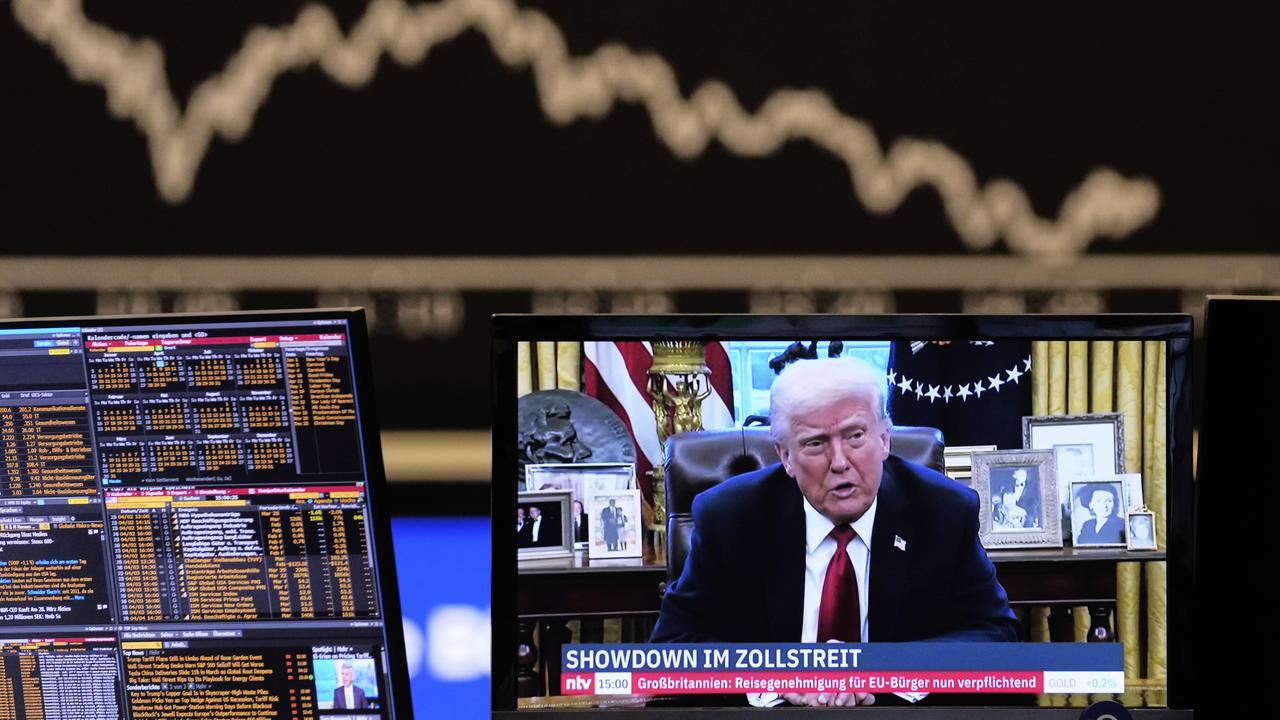
To join the conversation, please log in. Don't have an account? Register
Join the conversation, you are commenting as Logout